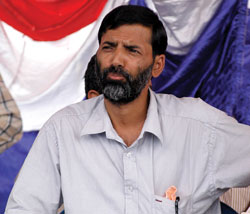 Interview with Janardan Sharma (Comrade Prabhakar), deputy commander of the Maoist western division.
Interview with Janardan Sharma (Comrade Prabhakar), deputy commander of the Maoist western division.
Radio Sagarmatha: What is your troop strength?
Comrade Prabhakar: We have seven divisions at present, this is our national army. At the local level there are hundreds of thousands of militia.
How about regular guerrillas?
This is an internal matter. It is not necessary to give you the exact figure. You can calculate yourself from the fact that we have seven divisions. What I can say is that we have enough strength to challenge the royal army.
When will you declare your exact troop strength and your weapons?
When Comrade Prachanda is involved in negotiations and when the subject of arms management comes up, headquarters will announce it.
Would you include your militia under a future arms management agreement?
It can be done separately from the PLA because it is not part of our main force.
Are you trying to hide your true strength?
No, we don't need to do that. It is not our intention to hide true numbers to hatch another conspiracy. We are trying to move towards a democratic republic as per the wishes of the people and that is what our party and our headquarters are involved in under the leadership of Comrade Prachanda.Guns aren't as important as ideas. We amassed weapons with our ideas. We started from zero weapons.
So how many weapons do you have?
I don't need to answer that either. This much I can say: we have captured some from the army and some we manufacture ourselves.
You stuck to your slogan of people's democracy and started your people's war and now you have changed the slogan to democratic republic. Why?
We have not lost our way. We have a dream of socialism-communism. But we have to move with the times. For the moment the Nepali people want an end to feudalism and to set up a capitalist democratic republic. Comrade Prachanda has publicly expressed a commitment to a peaceful, prosperous and great Nepal. And we want to do it with the political parties, civil society and the people.
So your armed struggle was a mistake?
As I said, we want to end feudalism and we want an inclusive democracy so that all the marginalised, suppressed and discriminated classes and groups are represented so they can participate in governance.
How do you aim to get there, through federalism?
We have suppressed classes, gender, ethnic and regional groups. We need to grant them autonomy and set up a united federal Nepal. We need to include all their needs, their cultures, their languages by giving them a say in the new constitution. The development of Nepal means the development of the janajatis. If they don't have a say in the state power structure they'll never have development. We have a dream of making Nepal into the Switzerland of Asia.
Couldn't this have been achieved without the loss of 13 or 14 thousand lives?
Even the 1990 constitution couldn't resolve these contradictions, it couldn't address the people's concerns. If we hadn't taken up arms, even the 19-day andolan wouldn't have happened. Let me ask you this: if it was possible without armed struggle why didn't it happen? The people understand this. The uprising was something the war brought about. Back when we made our 40-point demand no one listened to us. We didn't want to drag this country into conflict, but we had no choice.
People are confused: the parties who were your class enemies are now your allies. Baburam Bhattarai even said in 2001 that your party had worked closely with the palace. Why the change?
We didn't have an official agreement with the palace but at a time when the parties were trying to suppress us we had certain convergence to look for a solution. King Birendra perhaps had a vision for the future and didn't want the army invovled. But the andolan changed the parties and changed their behaviour. They understood that we reflected the aspirations of the people and they should work with us. We also understood coming out of war that we had to work with the parties towards setting up a republic. It was a mutual transformation.
What are your views on demobilisation and conflict resolution?
One aspect of it is to define the chain of command of the Nepal Army-a feudal army can't work towards a loktantrik Nepal. And just by removing the king as supreme commander you don't change the structure of the royal army. As for us, we have to figure out a way to ensure there are resources for the upkeep of the PLA. And then there is the question of what to do with weapons when we go for constituent assembly-and for this we'd like international supervision.
Why can't we do that ourselves?
People may not trust us, the best would be for the UN to take the lead because everyone trusts the UN. And then in the second phase after a new constitution is set up, we need to ensure that it is a Nepali Republican Army.


